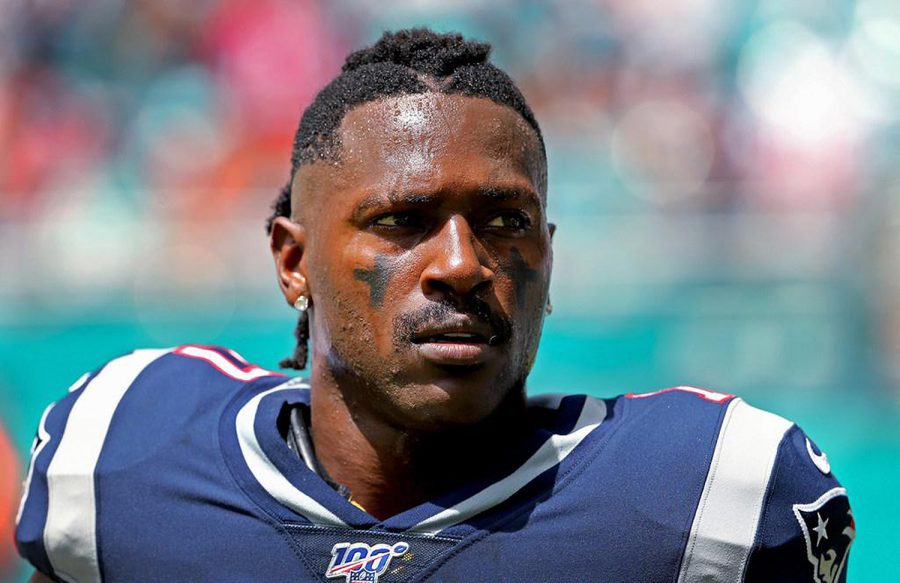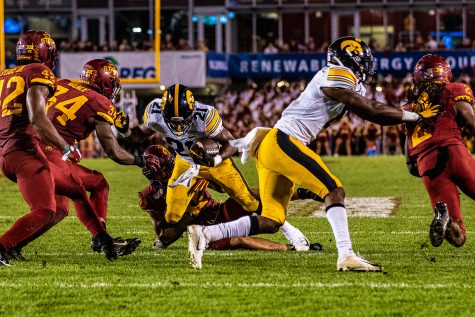Opinion: Antonio Brown shows young people what not to do on social media
The wide receiver used Twitter to make his professional situation worse, as opposed to other embattled figures such as Carson King.
New England Patriots wide receiver Antonio Brown looks on before the start of a game against the Miami Dolphins at Hard Rock Stadium in Miami Gardens, Fla., on September 15 2019.
September 26, 2019
The situation with Carson King is controversial and complicated. There are many contentious opinions surrounding the Altoona, Iowa, man, but there is one thing that can be universally applauded: his social-media behavior. After losing his deal with Anheuser-Busch, he has been gracious with his online reaction and has owned up to his mistakes from the past. King is a prime example of how one should behave during a media firestorm.
And then there’s NFL wide receiver Antonio Brown — the example of what not to do.
In a world that’s becoming increasingly sensitive to how prominent people behave online, it’s easy to get caught up in the spectacle of scandal. For many male celebrities, these new norms have caught up with them.
A few hours after escaping the Raider’s traveling circus of a franchise, Brown was off to New England to sign a one-year contract with the Patriots. Everything seemed on the upswing for Brown — joining a Super Bowl contender with a future Hall of Fame coach and quarterback. That was before the news broke of sexual-assault allegations from his former trainer.
Regardless of the claims against him, New England was comfortable enough with his situation to have him suit up for its Week 2 game against the Dolphins. Fresh off catching four passes and scoring a touchdown in his first game in a Patriot uniform, the arrow appeared to point up for Brown.
Then another sexual-misconduct allegation surfaced — this time from an unnamed artist whom he had commissioned to create a painting. Within a few days, New England released Antonio Brown.
The confusing part is that the first allegation was similar in nature to the second one, yet the Patriots’ responses following both were vastly different. The difference in the second allegation that led New England to release him can be seen in how Brown responded to it.
Following the news of the second allegation, Brown created a text chain involving both personal assistants and the accuser, posting pictures of her with her kids and directing his associates to investigate her. The text messages became public, and not long after Brown was released for failing to cease communications with the accuser as New England requested.
To dig his hole deeper, Brown then went on a social-media tirade. He insulted Patriots owner Robert Kraft, tweeting, “different strokes, different folks,” referencing Kraft’s incident with a Florida massage parlor.
Potentially to seal his fate with the NFL, Brown then alienated all owners when he tweeted, “Will not be playing in the @NFL anymore these owners can cancel deals do whatever they want at anytime we will see if the @NFLPA [will] hold them accountable.”
Does that sound like a player you want to employ if you are an NFL owner?
The point of all this is that as an athlete — or any person with notoriety — you are much more vulnerable to a litany of allegations and accusations. Regardless of whether wrongdoing occurred or not, you’re a target because of who you are and what you have. You can’t always prevent these things from happening, but you can protect yourself from further damage. What would Brown be doing right now had he simply allowed his legal team respond to the allegations? He’d probably be preparing for New England’s next game against the Bills.
Taking to social media only exaggerated his problem. Imagine how much less coverage Brown would have gotten had he never used his social media in the first place. The truth is that he dumped gallons of gasoline all over the fire for the media to devour.
Young people can gain great insight as to how to handle oneself simply by contrasting their social-media behavior to Brown’s. Simply put, you are under a microscope. When faced with a problematic circumstance that emerges in the public’s eye, all you can really do is control what you can. Don’t send that angry tweet and don’t respond to every Bob and Peggy who you think has wronged you. The fire will burn out eventually, so long as no more fuel is added to the flame.
Put another way, don’t be like Brown. Be like King.
Columns reflect the opinions of the authors and are not necessarily those of the Editorial Board, The Daily Iowan, or other organizations in which the author may be involved.


















